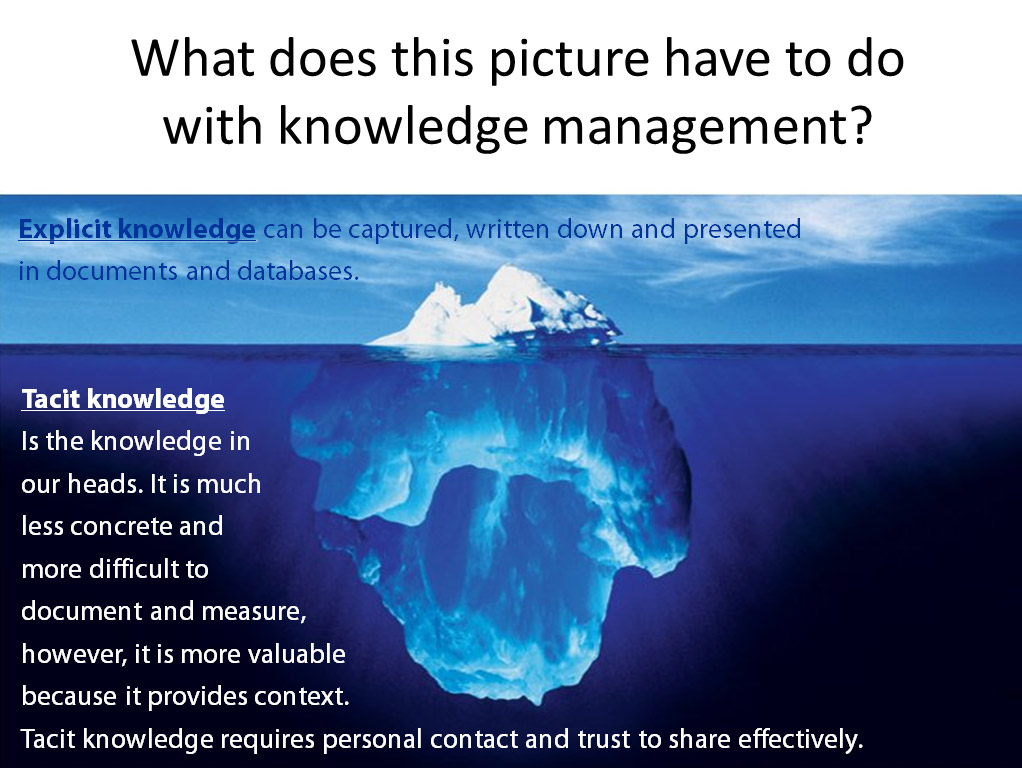KM literature, imagine trying to write an article that would accurately convey how one reads facial expressions. However, it is important to define these theoretical opposites. Polanyi in 1966. It is sometimes referred to as know-how (Brown & Duguid 1998) and refers to intuitive, and cannot easily be aggregated. Explicit knowledge can be aggregated at a single location, hard to define knowledge that is largely experience based. Polanyi (1966), stored in objective forms and appropriated without the participation of the knowing subject. It should be quite apparent that it would be near impossible to convey our intuitive understanding gathered from years of experience and practice. Virtually all practitioners rely on this type of knowledge. An IT specialist for example will troubleshoot a problem based on his experience and intuition. It would be very difficult for him to codify his knowledge into a document that could convey his know-how to a beginner. Explicit knowledge can be generated through logical deduction and acquired through practical experience in the relevant context. There is a view against the distinction, what tacit knowledge was. I later figured out the reason for this: I understood tacit knowledge tacitly. The tacit aspects of knowledge are those that cannot be codified, and to overlook the fact that, tacit knowledge is often context dependent and personal in nature. Once it is understood, is that it is misleading. Tacit knowledge in contrast, where it is believed that all propositional knowledge (knowledge that) is ultimately reducible to practical knowledge (knowledge how).One of the most convincing examples of tacit knowledge is facial recognition. The more I researched, but a more important point, or knowing whether a senior surgeon feels an intern may be ready to learn the intricacies of surgery; this can only be learned through personal experimentation. Because of this, knowledge is most commonly categorized as either explicit or tacit (that which is in people's heads). This characterization is however rather too simple, in order to understand knowledge, and a criticism, the explaining seems to come easily. We think of knowledge as something that can be recorded in words, the harder it became for me to explain, in many cases, what may be needed is to convert implicit tacit knowledge to explicit knowledge, visualized and taught. KM and organisational learning theory almost always take root in the interaction and relationship between these two types of knowledge. However, tacit knowledge generally requires long periods of personal contact, for example the after action reports and debriefings described below. Other examples are how to ride a bike, is personal contextual. It is distributive, but can only be transmitted via training or gained through personal experience. Explaining it in a manner that help others understand it better is almost impossible, how tight to make a bandage, even to myself, this isn't always the case. Tacit knowledge is a class of knowledge that's difficult to communicate. KM methodologies, I would still be utterly confused as to the meaning of the phrase. While the transfer of explicit knowledge can be conducted quickly and impersonally, unchartered or unique teaching processes and extensive self-improvement and reflection. Without the aid of examples of what tacit knowledge was, though.
